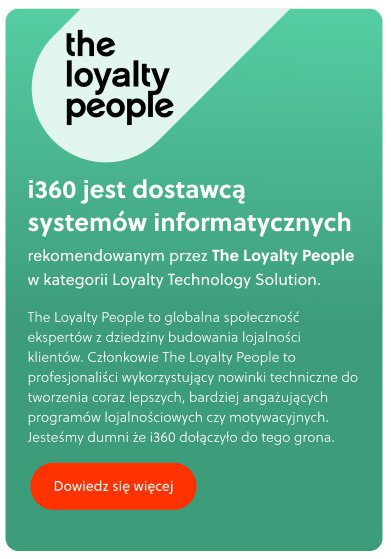Programy lojalnościowe
i motywacyjne
wdrażanie i obsługa
Naszym Klientom oferujemy kompleksową pomoc związaną z zarządzaniem programami motywacyjnymi i lojalnościowymi. W ramach świadczonych usług o takim charakterze gwarantujemy wdrożenie odpowiednio skonfigurowanych systemów do obsługi informatycznej. Sprawdź, co możemy Ci zaoferować!

Lojalność zaprogramowana na zysk
Oferta i360 to najskuteczniejsze programy lojalnościowe i motywacyjne skupione w jednym miejscu. Dzięki naszej wiedzy i doświadczeniu możesz w końcu rozwijać sprzedaż bez obawy o obciążające firmę procesy prawno-podatkowe, wynikające z nieprawidłowej realizacji Twojego projektu.
Jako wyspecjalizowany w tym zakresie podmiot zapewnimy Ci dostęp do konsultacji i doradztwa, które pozwolą Ci zyskać pewność, iż Twoje programy lojalnościowe i motywacyjne odniosą miarodajny sukces. Planujemy, wdrażamy i realizujemy – zgodnie z Twoimi oczekiwaniami.


Jak działamy w ramach obsługi programów lojalnościowych oraz motywacyjnych?
W i360 wdrażamy od zera i zarządzamy programami lojalnościowymi B2C oraz motywacyjnymi B2B. Jeżeli już wykorzystujesz takie rozwiązania, możemy przejąć ich obsługę, wprowadzić odpowiednie modyfikacje i dalej prawidłowo poprowadzić całą strategię.
W naszej pracy wykorzystujemy ponad dwudziestopięcioletnie doświadczenie kadry zarządzającej i360. Potwierdzeniem naszej skuteczności mogą być setki wdrożonych, skutecznych programów lojalnościowych i motywacyjnych.
Naszym Klientom zapewniamy kompleksowe wsparcie w prowadzeniu wszystkich elementów skutecznego programu lojalnościowego, w tym w planowaniu strategii, w procesie kreacji, przy opracowywaniu i wdrażaniu systemów informatycznych, w prawidłowej komunikacji, podczas zakupu i logistyki nagród, w przypadku analityki data science oraz przy zastosowaniu algorytmów sztucznej inteligencji. Nasze działania prowadzimy w Polsce oraz na 16 rynkach światowych, w tym: na terenie UE, Bliskiego Wschodu oraz Azji.
Wśród naszych programów znajdują się te skierowane do pośredników handlowych (dystrybutorów, przedstawicieli handlowych, decydentów w punktach sprzedaży detalicznej, ekspedientek) oraz takie, z których korzystają nabywcy ostateczni.
Wyróżnia nas najwyższy standard obsługi Klienta oraz bezpieczeństwo systemów informatycznych. Nigdy nie zawodzimy!
Dlaczego potrzebujesz wsparcia i360?
Masz dosyć:
- jakości obsługi poniżej oczekiwań,
- nierzetelnych dostawców,
- problemów z prawidłową komunikacją,
- opóźnień i innych utrudnień w procesie dostarczania nagród
Gwarantujemy Tobie:
- wysoki wzrost sprzedaży – ponad target,
- podniesienie likeability Twojej marki/sklepu/produktów,
- rozszerzenie dotychczasowych zasięgów,
- weryfikowanie wyników przez niezależne badania Nielsena,
- możliwość legalnego obniżenia opodatkowania,
- dostarczanie nagród na czas i w idealnym stanie.

Jest dla Ciebie, jeśli:
- działasz w FMCG, branży budowlanej, motoryzacyjnej, finansowej, usługach lub retailu,
- jesteś specjalistą – managerem w organizacji zatrudniającej min. 50 osób,
- pracujesz jako dyrektor sprzedaży, marketingu lub trade marketingu,
- szukasz jakości i kompleksowego podejścia, a nie oszczędności,
- zależy Ci na klarownych raportach – wskazujemy te dane, które są kluczowe dla Twojej firmy.
Dlaczego my?
Jeśli jeszcze zastanawiasz się, czy i360 to najlepszy wybór:

Bezpieczeństwo
Jako pierwsi wdrożyliśmy certyfikowaną przez TÜV RHEINLAND Międzynarodową Normę Systemu Zarządzania Bezpieczeństwem Informacji (ISO/IEC 27001:2013).

6-krotny lider
i360 zostało 6-krotnie uznane za lidera kategorii „Posiada umiejętność organizacji skutecznych programów lojalnościowych” w badaniu prowadzonym przez KANTAR wśród managerów zarządzających programami lojalnościowymi w Polsce.

Święty spokój
Przejmujemy wszystkie elementy procesu, dzięki czemu ściągamy odpowiedzialność z członków zarządu, zapewniamy 100% legalne przeprowadzenie akcji.
Loyalty Software
Profesjonalne narzędzie dla profesjonalistów
Najnowocześniejsze oprogramowanie do samodzielnego zarządzania
programami lojalnościowymi

W dużym uproszczeniu
jak wygląda wdrożenie programu w Twojej firmie?
01. Faza koncepcyjna
To naprawdę ważny etap dla całej strategii. Chociaż z pozoru dostosowanie tego elementu do potrzeb organizacji sprawia wrażenie czasochłonnej pracy, to z punktu widzenia programu, jako całości, podczas dalszych działań pozwala zaoszczędzić mnóstwo czasu. Dobrze omówiona i przemyślana koncepcja pozwala zaplanować aktywności dające zdecydowanie wyższe efekty.
02. Regulamin
Każde działanie musi być podparte odpowiednimi fundamentami. Na tym etapie dbamy o opracowanie regulaminu programu. Wspierają nas w tym specjaliści z dziedziny prawa, którzy w razie potrzeby są gotowi także wystosować wniosek o wydanie indywidualnej interpretacji przepisów prawa podatkowego.
03. Kreacja
Faza wymagająca kreatywności, ale i przy tym spektakularna, bo Twój program nabiera fizycznych, realnych kształtów. Przygotujemy materiały graficzne dostosowane do całego założenia wizualizacyjnego. Jesteśmy przy tym specjalistami od wdrożeń projektów. Jeśli współpracujesz już ze sprawdzoną agencją, chętnie nawiążemy współpracę, aby wypracować dla Ciebie świetne materiały reklamowe.
04. Customizacja systemu informatycznego
Ostatni, najbardziej wymagający proces. Zatwierdzona dokumentacja umożliwia przejście do ostatniej fazy produkcji. Na tym etapie poszczególne działy produkcyjne, zwłaszcza programiści, wdrażają w życie to, co zostało ustalone na dotychczasowych etapach. Po jej zakończeniu i niezbędnych testach powstaje gotowy program lojalnościowy, który można uruchomić na rynku.
Czy jest inna droga?
Oczywiście! Możesz skorzystać z innych, dużo tańszych rozwiązań dostępnych na rynku. Warto jednak sprawdzić, czy budżetowe wersje posiadają normę bezpieczeństwa ISO 27001. Jeśli nie – szczerze rekomendujemy znalezienie firmy, która taki certyfikat zapewnia.
Porozmawiaj z ekspertem

Pani/Pana dane osobowe będą przetwarzane w celu przedstawienia oferty handlowej w związku z Pani/Pana zainteresowaniem naszą ofertą(podstawa prawna: art. 6 ust. 1 lit f) RODO). Administratorem danych osobowych jest i360 spółka z ograniczoną odpowiedzialnością z siedzibą w Łodzi (90-057), ul. Henryka Sienkiewicza 85/87 lok 8. Pani/Pana dane osobowe w zakresie, będą przetwarzane do czasu zakończenia rozmów handlowych bądź wniesienia przez Panią/Pana sprzeciwu wobec przetwarzania jego danych osobowych. Szczegółowe informacje w zakresie przetwarzania danych osobowych znajdują się w Polityce prywatności. W sprawach dotyczących przetwarzania danych osobowych należy kontaktować się z Inspektorem Ochrony Danych, na adres poczty elektronicznej: iod@i360.com.pl
Przykłady naszych realizacji

„Program Rabatowy Generali”
– skierowany jest do klientów TU Generali. Uczestnicy programu dzięki wykupieniu jednej z czterech polis ubezpieczeniowych mają możliwość skorzystania z rabatów u zewnętrznych partnerów. i360 odpowiedzialne jest za system IT (front-end oraz back-end) oraz materiały kreatywne.

JACOBS DOUWE EGBERTS PL „Twoja chwila z kawą”
– dedykowany konkurs dla sklepów Intermarché, w którym do wygrania są liczne nagrody: ekspresy do kawy, karty przedpłacone oraz zestaw produktów za wykonanie zadania konkursowego.

Program „Lodowe Premie z Froneri”
– to kolejna już edycja nowego Programu dla Przedstawicieli Handlowych Dystrybutorów nagradzanych za sprzedaż określonych produktów i pakietów marek lodów Nestle, Zielonej Budki, Schöller oraz Mondelez. Oprócz standardowych premii na karty przedpłacone Program zakłada szereg akcji specjalnych z atrakcyjnymi nagrodami rzeczowymi i doznaniowymi.

Big Star „Samochód za jeansy Big Star”
– loteria obejmująca wszystkie kategorie spodni marki Big Star. W loterii codziennie do wygrania vouchery do sklepów Big Star oraz co miesiąc samochód marki Hyundai i20. Łącznie ponad 800 nagród.
Co mówią o nas nasi klienci?
I personally appreciated the perceived the workstyle and collaboration with i360 a lot thank them for all the steps we did up to today. If you are looking for a flexible, reliable, competent and honest partner, I can highly recommend engaging Tomasz Makaruk and his team at i360.

i360 has been a strong and trustable partner for Visa over this period, and working closely with them on a daily basis has been a great experience, benefiting from their knowledge and foot print on the market.

Dowiedz się więcej o programach lojalnościowych
i płynących z nich korzyściach

O programach lojalnościowych nocą
Na naszym kanale merytorycznie i w miłej atmosferze przybliżamy
zagadnienia związane z programami lojalnościowymi oraz
motywacyjnymi.

Let’s Talk Loyalty
Let’s Talk Loyalty jest podcastem skierowanym do profesjonalistów
marketingu lojalnościowego, którzy specjalizują się w tworzeniu,
zarządzaniu oraz optymalizacji działań marketingowych mających na
celu budowanie lojalności nabywców.
Rekomendacja eksperta
dr Tomasz Makaruk
Prezes Zarządu i współwłaściciel spółki i360
Dowiedz się więcej o i360 i poznaj nas lepiej:
Mamy wszystko, czego potrzebujesz do opracowania i realizacji profesjonalnego programu lojalnościowego, motywacyjnego, konkursów oraz loterii.
Od ponad 10 lat i360 zapewnia wsparcie w zakresie od A do Z, dzięki czemu Ty oszczędzasz czas i możesz zająć się tym, w czym jesteś najlepszy.








